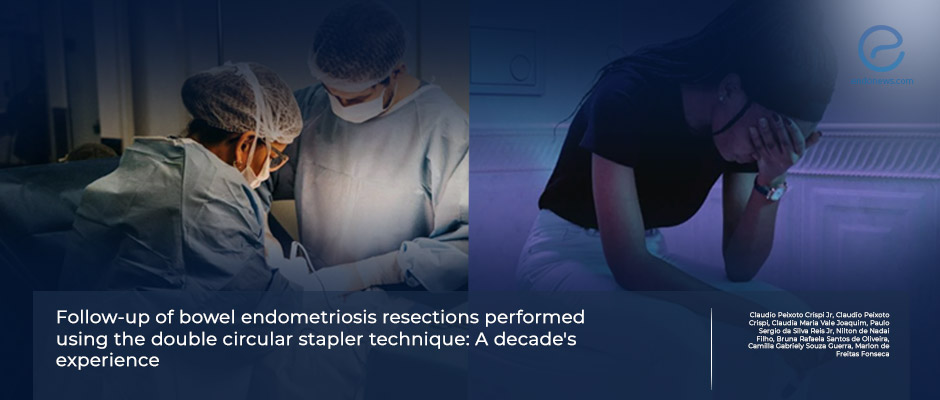Double Circular Stapler Technique: A Safe and Effective Approach for Colorectal Deep Endometriosis
Jul 2, 2025
Retrospective study confirms feasibility and safety of a minimally invasive technique for colorectal deep endometriosis
Key Points
Highlights:
- The double circular stapler technique (DCST) is a feasible, safe, and effective approach for managing colorectal deep endometriosis.
- Long-term outcomes demonstrate significant improvements in pain, bowel function, and fertility; and avoids segmental bowel resection when properly indicated and performed.
Importance:
- This study supports the role of DCST as a minimally invasive alternative for colorectal deep endometriosis, particularly in patients where extensive resection can be avoided.
What’s done here:
- This retrospective case series analyzed early and long-term functional outcomes in 43 women treated with DCST for colorectal deep endometriosis from 2010 to 2021.
- Outcomes included pain scores, bowel and urinary function, surgical complications, and conception rates.
- Patients were followed for a median of 38.2 months.
Key results:
- No conversions to open surgery, blood transfusions, ostomies, or anastomotic leaks occurred.
- No patients experienced long-term urinary retention postoperatively.
- At follow-up, 88–100% of women reported substantial symptom relief for dysuria, dyschezia, dysmenorrhea, dyspareunia, and cyclic low back pain.
- Of 20 women desiring pregnancy, up to70% conceived after surgery.
Limitations:
- Retrospective, uncontrolled design limits causal inferences, small sample size restricts precise estimation of complication risks.
- Bowel and bladder dysfunctions were not systematically assessed.
From the Editor-in-Chief – EndoNews
"This study reinforces the double circular stapler technique as a valuable minimally invasive option for colorectal deep endometriosis. By avoiding segmental bowel resection, it reduces surgical morbidity while achieving significant improvements in pain, bowel function, and fertility outcomes.
The absence of major complications such as anastomotic leaks or long-term urinary retention underscores the procedure’s safety when performed by experienced hands. Importantly, the 70% pregnancy rate postoperatively highlights its fertility-preserving potential.
As deep endometriosis management evolves, this work reminds us that tailored surgical strategies—when properly indicated—can offer excellent functional outcomes with less invasiveness."
Lay Summary
The double circular stapler technique (DCST) offers a safe and effective minimally invasive option for managing colorectal deep endometriosis, according to a long-term follow-up study published in PLOS ONE.
Led by Dr. Marlon de Freitas Fonseca from the Crispi Institute of Minimally Invasive Surgery and Oswaldo Cruz Foundation, the Brazilian team analyzed outcomes in 43 women treated with DCST between 2010 and 2021. The study found no conversions to open surgery, no need for blood transfusions or ostomies, and no cases of anastomotic leakage. Only one patient experienced a rectovaginal fistula, and none developed long-term urinary retention.
At the most recent follow-up of median 38.2 months, 88–100% of women reported significant relief from dysuria, dyschezia, dysmenorrhea, dyspareunia, and cyclic low back pain. Among those desiring pregnancy, 70% conceived postoperatively. One patient experienced worsening intestinal function requiring continuous laxatives.
DCST involves the sequential use of two transanal circular staplers to achieve complete discoid resection of rectosigmoid lesions, offering a promising alternative to segmental colorectal resection when properly indicated and performed.
Research Source: https://pubmed.ncbi.nlm.nih.gov/40294015/
deep endometriois surgery complications

